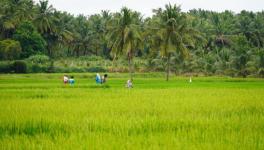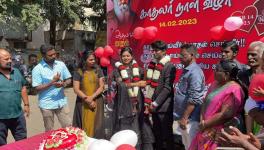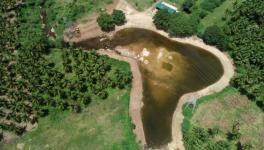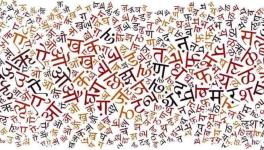What the DNA of a 4500 year-old Skeleton from Rakhigarhi has to say about Ancient India
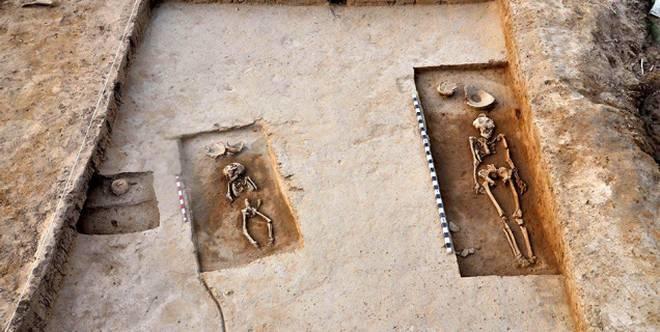
Image Courtesy: The Hindu
A man might have died some 4500 years back, but his skeleton and the DNA present in it can reveal historical facts that are important to study the inhabitants of the Harappan civilisation. The skeleton excavated from the village Rakhigarhi in Haryana had enough DNA to disclose its ancestry. An analysis of the DNA showed that the skeleton was more linked to a Dravidian tribal group named ‘Irula’, currently living in Tamil Nadu and Kerala in the Nilgiri highlands. Political sensitivity surrounding the issue had delayed publishing the study, but finally it is thought to be ready for print, as described in India Today, along with the data. It is expected to appear in Science this month.
The R1a1 gene, loosely called the ‘Aryan Gene’ was not found to be present in the DNA retrieved from the skeleton. This is remarkable, not only because of the scientific artefacts, but also as a stepping stone towards settling a much debated chapter of ancient Indian history. This finding holds the possibility to thwart the right wing claim of the Indus Valley Civilisation being a Vedic Hindu civilisation.
By now, it is almost clear that the R1a1 gene had originally belonged to a Bronze Age population of the central Asia. This population migrated from their homeland in the central Asian steppes. The steppes are the grasslands sandwiched between the Black Sea and the Caspian. With a wave of migration beginning about 6000 years ago, this population landed up in India at most 4000 years back. This migration left a strong and peculiar genetic impact on the population of the sub-continent. The peculiarity of the genetic transmission is that this gene was transmitted primarily by males and now, approximately 17.5 per cent of the Indian male population has this gene. Reversely, the DNA of the modern Indian females show very little influence of the population migrated from the steppes. The inference that can be drawn from it is that the females of the steppe population didn’t mate with the males belonging to the population already present in ancient India in significant numbers. On the other hand, the steppe males mated extensively with the females in India.
The results also show that the sample, along with Dravidian origins, has evidence of mixing with another population that migrated to ancient India. This population is said to be of the ‘Iranian agriculturalists’. This population, migrated from the ‘fertile crescent’ of West Asia, is thought to have introduced agricultural techniques in ancient India.
The fact that the Aryan genetic imprint is absent in the first ever genome deciphered from an individual belonging to the Indus Valley civilisation will bolster that this civilisation preceded the migration of the Aryans and was also distinct from it.
The Indus Valley civilisation was first discovered during the colonial period, when Mohenjodaro, currently in Sindh, Pakistan, was first excavated in the 1920s. The colonial archaeologists were quick to identify the fact that this civilisation represented a pre-Vedic culture and it was on a decline at the time of the invasion of the Aryans. This Aryan invasion theory has been contested for long by the mainstream historians.
Rakhigarhi has also witnessed archaeological excavations, though intermittently, since the late 1960s. The excavations established Rakhigarhi as an urban settlement of the Indus Valley civilisation, probably beginning around the seventh millennium BCE. Rakhigarhi, with its seven teelas or mounds has much evidence to show that it was a matured Harappan settlement that witnessed both the rise and fall (some 4000 years ago) of the ancient civilisation.
The latest excavation done in 2015 by the team led by Dr. Vasant Shinde was able to retrieve the skeleton of a man dated some 4000 years back. However, the delay in the declaration of the much awaited results pertains to the political sensitivity that the issue holds. This was reflected in the interview of Dr. Shinde carried by India Today a year back. Even before the Rakhigarhi findings could surface, there were attempts to establish the Hindutva narrative – that the results would hint towards the continuity between the Indus Valley people and the present population - through social media and newspaper articles. The pressure put on the researchers was an assertion of the idea that the Indus Valley civilisation was Vedic Hindu, which has been contested by historians, archaeologists, and geneticists alike.
Get the latest reports & analysis with people's perspective on Protests, movements & deep analytical videos, discussions of the current affairs in your Telegram app. Subscribe to NewsClick's Telegram channel & get Real-Time updates on stories, as they get published on our website.









